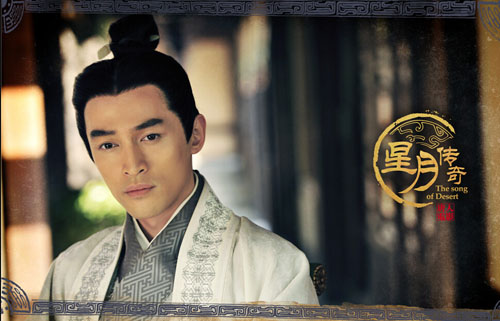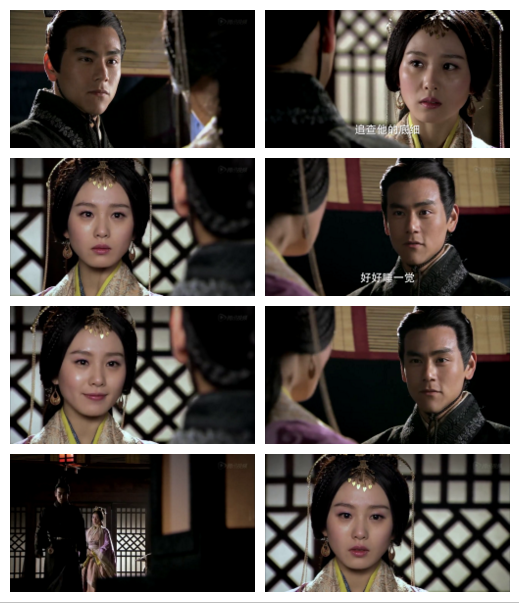
You know me. After watching a good show, I can't resist analysing it deeper to find out what worked so well for it so I can apply that to my own stories. (That fangirl-y post I wrote previously doesn't count as an analysis!) So here are some lessons about writing a swoon-worthy story Sound of the Desert has taught me:
1. Backstory give your characters depth
... and makes your readers/audience more empathetic to your characters.
All the main characters in the show - particularly Xin Yue and Wei Wuji - have fully fleshed out backstory that isn't served to the audience in huge doses (the equivalent of rambling expository passages in a novel).
Xin Yue herself is a very compelling protagonist. Her past is complicated - when we first meet her, she is living among wolves. Her adoptive father was killed, and she's roaming the desert, lonely and lost. It is only when she decides to travel to Jian An, of which her father had always told her wondrous stories, that she is filled with purpose.
 |
| You immediately want to root for this brave, free-spirited girl from the desert. |
Wei Wuji, too, is an illegitimate child who rose quickly among the ranks of the military to become a general at a young age and win every battle he ever fought. As the emperor's favourite, he has to contend with gossip and people waiting for him to fail.

In a way, those two are similar in that they are outcasts, underdogs. They don't quite fit in where they are. Xin Yue neither fully belongs in the desert (she was roaming freely but aimlessly with her wolf pack), nor in the city with all its social hierarchy and rules and palace politics. Wuji distances himself from everyone because he doesn't know whom to trust, and focuses on winning every battle because that's the only way he can shut up the naysayers.
When two lonely souls meet, you know that's a love story waiting to blossom.

2. Everyone has a flaw
... and how they regard that flaw determines who they are and who they will become.
Xin Yue's most notable flaw is that she chooses to stubbornly turn a blind eye to Wuji's love, instead choosing to chase Jiu Ye and demean herself to the extent of begging him to love her and getting herself drunk when she is rejected over and over.

Many times, I wanted to grab her by the shoulders and shake her. Get over it, you idiot! But I'm sure we all know what it's like to to be in a one-sided relationship. Moving on is easier said than done, but we are SO MUCH happier once we decide and manage to - as Xin Yue is when she finally accepts Wuji and lets go of Jiu Ye.

And as mentioned earlier, Wuji has trust issues because he feels that everyone around him in court is a fucking two-face. As such, he appears cold, arrogant, and aloof. But it is only when he's around Xin Yue that he can be entirely himself and reveal his warm, romantic, playful nature. Even so, at the beginning, he is wary of her and didn't give her his real name, which would eventually become his biggest regret because Xin Yue couldn't find him when she reached the city and he thus couldn't be there for her in her time of need (Jiu Ye found her instead).

Jiu Ye is indecisive as hell. Which makes him one of the most frustrating characters to watch in the show. Make up your mind, for crying out loud! Here's a girl confessing to you time and again, and if you're going to reject her harshly then make a clean break and stop leading her on. Also, the fact that he keeps her at a distance and doesn't tell her the truth about why he's unable to accept her love is a recipe for heartbreak down the road. So we can all safely conclude that his wretched ending was entirely his own fault.

3. Supporting characters bring out different facets of the protagonists
Where would Xin Yue be without her sister-from-another-mother, Hong Gu, who first took her in when she entered the city and had no job or connections? And how would she come to appreciate her father's parting words for her to always look forward with hope in her eyes instead of remaining stuck in hatred in the past had she not met Qin Xiang, who enters the palace just to exact revenge on the royal family?
And if it weren't for Jiu Ye, she would not have grown into a strong, confident woman whom Wuji regards as her equal. She blossoms under his love, and is free to be herself unapologetically.
 |
| That look of longing hits a brick wall. |
With Jiu Ye, she always has to second-guess herself, and is uncertain of what he's thinking even though she tries to read the books he reads and bond with him over flute-playing. Jiu Ye was a necessary part of her life that let her figure out what she needed and wanted to be.
For Wuji, his uncle plays the father figure in his life (after his actual father deserted him and his mom married another man), so a large part of his upright, loyal and honourable personality, unsullied by greed for power or money, is because of his uncle's upbringing. Meanwhile, his uncle's son is a snivelling little weasel who plays underhanded tricks and serves as a stark contrast to Wuji's character.
 |
| That powerful gaze! Eddie gives life to the character. |
4. Scenes need to vary in intensity and length
Pacing is everything. Or at least, one of the most crucial factors that can make or break a story. A well-told story balances long, introspective or intimate scenes with punchy, high-octane ones expertly.
Between Xin Yue and Wuji's cute banter and Jiu Ye's mopey staring out the snowy window and flute-blowing, other subplots unfold. Scheming court officials, battles with the fierce nomadic Xiongnu tribe (Jolecole explains the history a bit more here, and also lays high praise on Eddie), et cetera.
Subplots are a great way to break up the main narrative, which can grow tedious on its own. If woven skillfully in, they can and should also further the main plot and add more dimensions to it while teasing out more character dynamics.
5. Character growth is one of the most gratifying journey
Xin Yue had been adamant about having Jiu Ye right from the start. She only had eyes for him, and didn't give a shit about Wuji always being there to comfort her when she gets her heart trampled upon by Jiu Ye, to protect her from the people from her past she is hiding from, or just there when she needs a friend in a new, foreign city.
 |
| Xin Yue is touched when Wuji told her she's not alone in Jian An. |
It was only after she decided to let go of her past - her hatred for the people who killed her father and her unrequited affection for Jiu Ye - that she manages to bravely move on to a new chapter in her life.

As the audience, we grow together with her. We empathise with her predicament, understand the struggles she goes through to make her final decisions, and experience the same catharsis when she chooses to embrace a new life with Wuji.
And lastly, this lesson isn't about writing, but love.
6. Love is about timing
As Dreaming Snowflake said,
(Sound of the Desert) has always been a story that tells us that love is about timing, however, also that love favours the brave and those who fight for it and never give up and Wei Wuji is the epitome of never-say-die attitude be in it love or in war.

Gotta love a man who would fight valiantly for what he wants.
So while appreciating a mighty fine specimen like Eddie Peng, these truths are what I gleaned. Writing lessons can be derived from anywhere and everywhere, especially in the stories that move you. And the best lessons come unexpectedly, like from a drama like Sound of the Desert that I never thought I would ever watch.
What did you derive from Sound of the Desert, or any other stories that moved you?
No comments :
Post a Comment